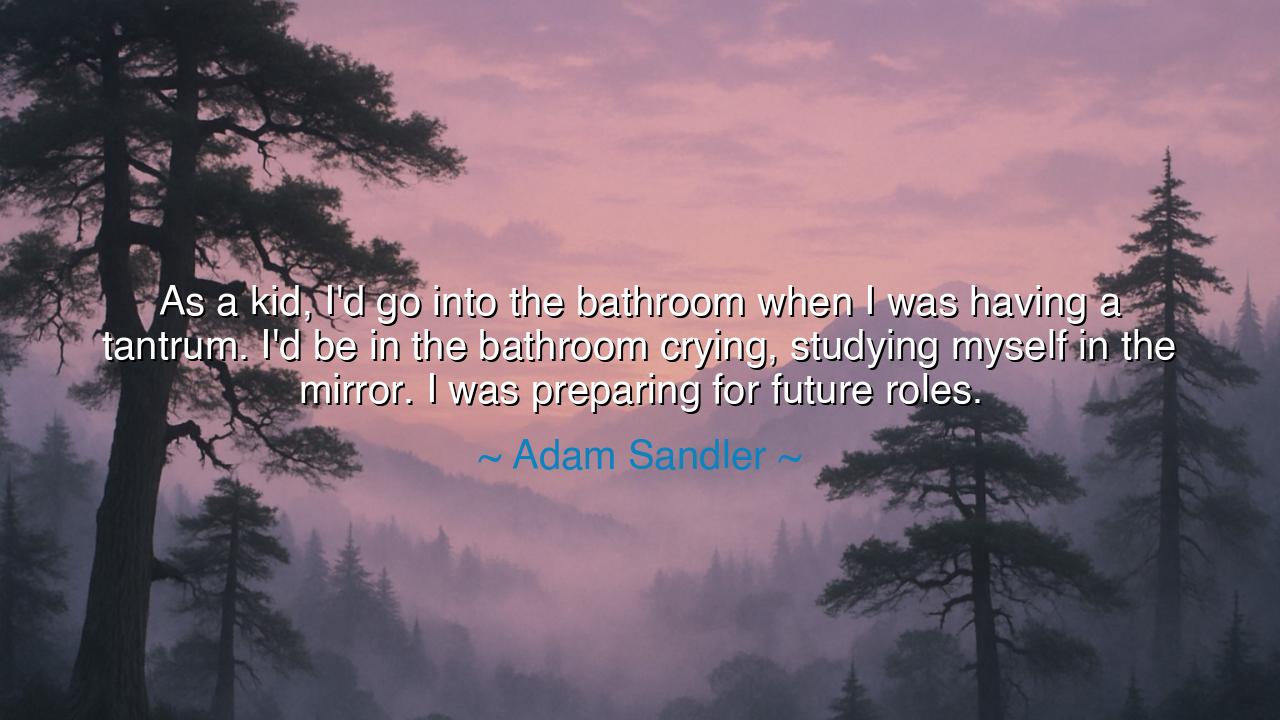
As a kid, I'd go into the bathroom when I was having a tantrum.
As a kid, I'd go into the bathroom when I was having a tantrum. I'd be in the bathroom crying, studying myself in the mirror. I was preparing for future roles.






In the ancient days, there were those who would retreat to quiet places—often alone and in the solitude of their own thoughts—to prepare themselves for what life would demand of them. These moments of self-reflection were not simply moments of solitude; they were times to sharpen one's mind, to reflect on personal turmoil, and to harness the depths of one’s emotions. It is in these times of inner conflict that the seeds of greatness are often planted. In the words of Adam Sandler, we hear a similar echo: “As a kid, I’d go into the bathroom when I was having a tantrum. I’d be in the bathroom crying, studying myself in the mirror. I was preparing for future roles.”
Sandler’s reflection speaks to the idea that emotional turmoil is not merely something to be avoided or shamed; rather, it is a tool—a source of energy—that can be molded and refined for future purposes. Crying, in Sandler’s words, was not a moment of weakness, but an act of preparation—a way to study himself, to understand and embrace his emotions, and to eventually channel them into something larger than himself. In this, Sandler reveals a deeper truth about growth: it is not the absence of hardship or emotional conflict that shapes us, but our ability to transform these very experiences into the foundation for what we will become.
In ancient Greece, actors and philosophers alike often sought the art of self-examination to understand their place in the world. Aristotle spoke of catharsis, the purging of emotions through art, particularly through tragedy. The ancient Greek actors, who performed on grand stages, knew the power of their emotions. They would often immerse themselves in intense self-reflection before stepping onto the stage, preparing not only their lines but their hearts. It was in these quiet moments of solitude that they would connect with their inner turmoil, the very thing that would allow them to perform with authenticity and depth. Like Sandler, these actors knew that emotional release and introspection were key to truly mastering their craft.
This concept of turning inward in the face of emotional upheaval can be traced even further back, to Buddhist teachings, where the importance of mindfulness and self-awareness was paramount. The Buddha, in his search for enlightenment, understood that it was in moments of inner struggle that the seeds of wisdom and peace could be found. Just as Sandler spent time in front of the mirror, confronting his own emotions, the Buddha taught that one must face the storms within and learn from them rather than flee from them. The practice of self-reflection allows one to gain control over emotions, transform them, and eventually use them as a force for good.
Sandler’s words also call to mind the stories of great warriors who, before they went into battle, would often sit alone in meditation, preparing not just their bodies but their spirits. The great samurai of Japan, for example, would engage in quiet contemplation before battle, examining their fears, insecurities, and desires. In doing so, they would not only prepare themselves for the physical fight but also for the emotional battle within. This was seen as essential to their success in battle, for the warrior who does not know his own mind cannot fight with clarity. Similarly, Sandler’s preparation through emotional self-study laid the groundwork for his ability to perform with authenticity and depth in his later roles.
The lesson for us is clear: do not shy away from your own emotions. Embrace them, for they are not burdens to bear, but tools to be used in the crafting of a meaningful life. Just as Sandler learned to harness his feelings, so too must we learn to embrace our own inner conflicts and transform them into something of value. Whether in art, leadership, or personal growth, our struggles are not weaknesses—they are the very things that will shape our future if we approach them with awareness and introspection.
In your own life, take time to reflect on your emotions rather than run from them. Use moments of anger, frustration, or sadness as opportunities to learn about yourself. Stand before the mirror as Sandler did and study your face, not just as a reflection of your outer self, but as a way to understand your inner world. Harness these feelings, and let them guide you to the next stage of your journey, for it is through embracing our deepest emotions that we discover our true potential. Transformation begins within, and it is through self-reflection that we find the strength to become who we are meant to be.






AAdministratorAdministrator
Welcome, honored guests. Please leave a comment, we will respond soon